The last several weeks, I have had some amazing guest posts from an array of fellow speech pathologists, educators and parents. I didn’t want any of you to miss these fantastic posts, so here are snippets of each post. Just click “Read more…” After each snippet to check out the rest of the post. ENJOY!
Once Upon a Time in Speech {Using Fairy Tales to Develop Speech & Language Skills in Young Children}
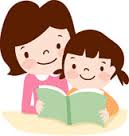
By Maureen from The Speech Bubble
Fairy tales. These stories have been around for many years, but if you ask a 5 year old they will tell you that Rapunzel was created only 2 years ago and that she has a pet lizard. While movies have helped these classic tales reach the masses, most children do know they are books! Fairy tales can offer so much more to children then just entertainment. They can help children develop their language and comprehension skills, as well as, problem solving and learning social skills. Since fairy tales bring a lot to the table I wanted to share how they can be used in a speech therapy setting and at home.
Building Receptive Language Skills at Home
by Jenna from Speech Room News
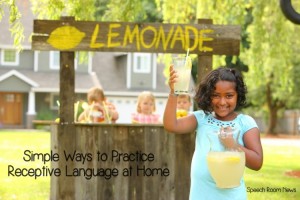
Language is often separated into two parts. Expressive language is what your child can say and express verbally. Receptive language is what your child can understand. While expressive language is sometimes to easiest to identify as delayed, delays in receptive language can have a significant impact on a child’s ability to function at home and in preschool. Children with receptive language delays struggle with skills such as understanding directions, understanding stories read to him/her, identifying vocabulary items and answering questions.
Building Speech & Language Skills Under the Table
By Teach Speech 365
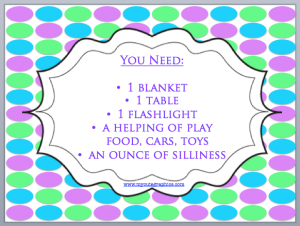
“Quick, get under the table!â€
What?!?!Usually this phrase involves some kind of weather drill. Not this time though!! This activity works well with children ages 2-4 year olds.Without a doubt, I have had some of my best therapy sessions underneath the table. This can also be a fun activity for parents to do at home though too! So grab a blanket and read on to see how you can target articulation and/or language skills (even social skills) from underneath a table…First things first. This is what you will need to make this activity a success:
Speech & Language Tips for Late Talkers
by Felice from The Dabbling Speechie
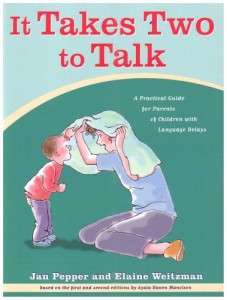
Greetings from The Dabbling Speechie! I am here today to share some of the techniques that I found to be helpful with getting those little ones who are late talkers to start using words to communicate. When my 4 year old was an infant, I worked part time at a private practice with children 18 months to 2 ½ years of age. I loved working with this population because I was able to work alongside parents teaching them how to facilitate communication in the home setting. As an SLP, I used many of the principles and tricks from the book It Takes Two To Talk
 by Jan Pepper & Elaine Weitzman to show my parents how they could contribute to their child’s language development throughout the week outside the therapy room.
10 Things I Wished I had Known About Childhood Apraxia of Speech (CAS)
by Leslie Lindsay, RN BSN Author of SPEAKING OF APRAXIA: A Parent’s Guide to Childhood Apraxia of Speech
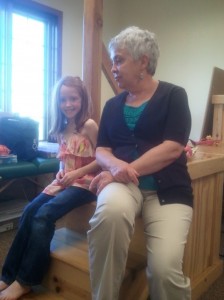
When I look back over the years of our apraxia journey, I am reminded of the simple truths I wish I had known long ago, wholesome happy moments that really have little to do with apraxia and more to do with being a mother, a child, and a family. Here goes:
-
A child is a child no matter what. I may have wished for a perfect child who was above average in all their pursuits, but what fun is that? Perfection has its downsides; I’d rather a child full of whim and vigor, a child who needs to overcome obstacles to understand that not everything is easy-peasy achievable in this life.
-
I am a mother first and an advocate second. It may seem as if there’s little differentiation between the two, but I like to think that first I became a mother; providing snuggles and love, safety, food, shelter and clothing.  And then I became an advocate, seeking ways to help my child be the best she can be in terms of her speech development.
Summer Activities to Promote Language & Communication with Older Children
by Miss Speechy from Speech Time Fun
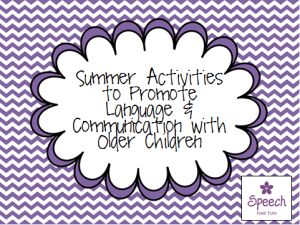
There are TONS of activities and suggestions out there for promoting language for younger children (preschool, early elementary, and younger). However, there are not as many available to promote language skills in older elementary, middle, and high school students with speech and language weaknesses.
Honk Honk! Speech Practice for the Car!
by Jenn from Crazy Speech World
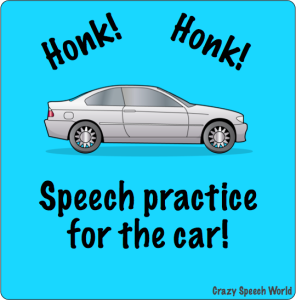
Where do many families spend a good amount of time each day where they are forced to sit together?
Give up? Â The CAR!
Picture it…many kids and parents go to and from places each day in their vehicle.  What are they doing?  Listening to music, playing electronics, chatting…but you know what is perfect for this time???  SPEECH PRACTICE!  Parents are always asking me about how they can possibly fit practice time in and this is usually my first answer!
Building Speech & Language with Goodnight Goodnight Construction Site
by Carrie from Carrie’s Speech Corner

I’m so happy to be sharing a guest post today on Playing with Words 365!  Katie’s blog was a big inspiration to me in starting my own blog and she has proven to be a wealth of information, not only regarding speech and language, but on blogging as well!  If you’re not familiar with my blog, Carrie’s Speech Corner, I invite you to head on over and check it out.  The most popular feature on the blog is my “Book of the Week.† Each week (give or take), I share one of my favorite books to use in my speech and language therapy sessions and provide activities and/or ideas to accompany the book.
Today, I’d like to share one of my favorite books that we read, not just in my therapy room, but in my home!  It’s called “Goodnight, Goodnight Construction Site†and was written by Sherri Duskey Rinker and Tom Lichtenheld.
Core Language Skills Children Should Have Before Starting Kindergarten
by Carissa from Home Sweet Speech Room
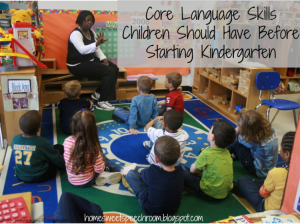
Thank you so much to Katie for this fabulous opportunity to guest post today! Â The topic today is the core language skills children should have before they start kindergarten. Â These are the skills that are essential for future learning and development.
Please note: These are general skills that students should have.  All children develop at their own rate.  Some will develop these skills a bit earlier, and some will develop them a little later.  As always, if you have any questions or concerns about a child’s speech or language skills, please contact a licensed, ASHA-certified speech-language pathologist.
Childhood Stuttering: Information, Warning Signs, and Tips for Parents
by Lauren from Busy Bee Speech
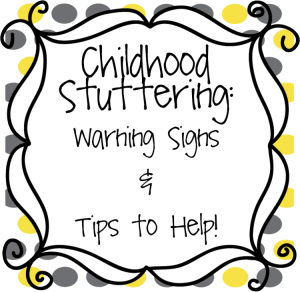
I am so beyond excited to be able to chat with you today!  Thanks so much to Katie for including me in her fabulous series of guest posts.  My name is Lauren and I blog over at Busy Bee Speech.  Today, we are going to peek a little into the world of stuttering.
Fluency (or stuttering) has become something that I’ve kinda had to get a handle on quickly.  Back in grad school, my professor dubbed me the “fluency queen†because I ended up with so many fluency hours in both diagnostic and treatment.  Now working in the schools, I somehow end up with all of the stuttering cases.  I’m beginning to think I’m some sort of magnet for them.  Haha.
Transitioning Back to School with Visuals {For Children of ALL Abilities}
by CC  from If Only I Had Super Powers
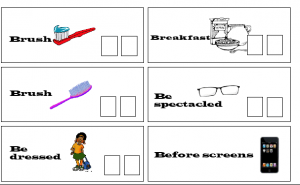
It’s that time of year again! The days are getting shorter and the novelty of summer is wearing off.
To the relief of many parents that means that school will be starting up again soon! But it also means that routines need to be re-established (or established for the first time!) and families need to be on a tight schedule!
Most children, regardless of whether they have special needs, benefit from a schedule to keep them moving in the morning. Schedules are easy to create when you do the same things every day. They provide a sense of stability, especially for individuals that thrive on routines and knowing what is coming next.
Summer Fun Books & Crafts For Speech & Language
by Kristine from Live Love Speech
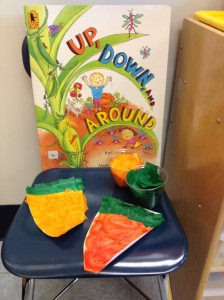
Do you have students/kids that just love doing “hands-on†projects and activities?  What about students who can’t get enough of fun books with awesome graphics?  If this sounds like some of the students/kids you know, then you must keep reading!  I am going to share with you some crafts, recipes, and projects that pair perfectly with adorable children’s books!
Autism in the Schools: 5 Team Tips
by Kristine  from Speak Listen Play
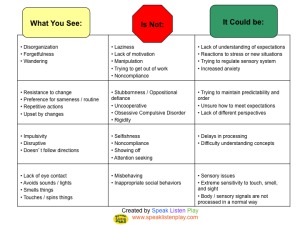
Special Education is about about providing support and services for one curriculum – the general education curriculum. Special Education consists of supports and services, it is not a place. All students should learn in the general education enviroment to the greatest extent possible. There are no easy answers, but I would like to outline some collaboritive strategies to help teachers, therapists, parents, etc. when working with students with Autism in the schools.
Three Fun Materials for Children with Intellectual Disabilities
by Shannon from Speechy Musings

First, I’d like to begin by thanking Katie for inviting me to post! If you don’t know me, I’m Shannon from over at Speechy Musings. I am currently in my second semester of graduate school for speech-language pathology. On my blog, you’ll find a ton of my materials, reviews, resources, and ideas for speech therapy! Today, I’m going to share three ideas for age appropriate materials for children with intellectual disabilities! Hopefully, this information will be helpful for both parents and professionals! You can definitely use ALL of these materials for children who don’t have ID as well.
Building Language with Wordless Picture Books
by Katie from Let’s Grow Speech
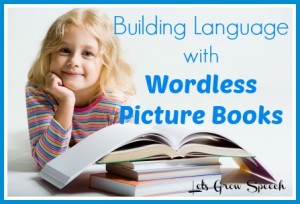
I am so excited to be guest posting at Playing with Words 365. I love everything Katie creates, and I’m grateful for the chance to be part of what she’s doing to help parents and speech-language pathologists. I was recently talking to a friend about some of our favorite children’s books. We got on the topic of wordless picture books and my friend replied that she didn’t really care for wordless books. When I asked her why, she said she didn’t really know what to do with them and she preferred to be able to just read a story to her son. That got me thinking, because I LOVE wordless books, but I know not everyone shares that affection. Books with no words can seem uninteresting or daunting, because they take more creativity, provide less structure, and maybe don’t hold the attention of your young ones. So WHY do I love wordless picture books and WHAT do I do with them?
Science Activities to Promote Language and Communication
by Kristina from Toddler Approved
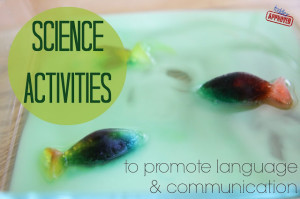
Science is seriously awesome. It is sensory, social, and chock full of language building opportunities! As a stay-at-home mom and former teacher, I love to look for teachable moments as we play and explore each day. Science is a huge part of our daily lives. As parents and educators we can infuse science activities into each day in simple ways than can make a big difference.
Here are four easy science activities that I really enjoy doing with my kids…
IEP? What is That? What Should I Expect?
by Amy from Major Speech Pathology Fun
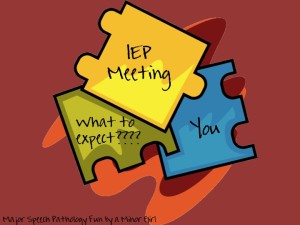
I am thrilled to be able to write a guest post for Katie over here at Playing with Words 365. I have learned so much from this blog and I hope you find my post informational as well. I was trying to think of a topic to write about and I started thinking about the beginning of the school year from a parent’s perspective. I tried to put myself in a parent’s shoes by trying to think about what i would be nervous about for the upcoming school year for a child that is going into special services for the first time. What would I want to know? What should I expect?
For speech pathologists, special education teachers and school psychologists IEP’s can become routine so often I forget to tell a parent what an IEP even is? So that is where I will start today.
Increasing Client Awareness and Carryover of Speech and Language Goals
by Jessica from Consonantly Speaking & Speechie FreebiesÂ

At the end of the 2012-2013 school year, I had my students complete surveys (found atYourTherapySouce.com) as to what they liked, disliked, learned, and wanted to learn about their speech and language therapy sessions. Prior to passing out this survey, I had recalled every session or two, explaining what each student’s goals were to him or her. I felt confident in my strong points of sharing goal knowledge, keeping therapy fun, and choosing activities relevant to student age/interest. What I found out was eye opening – my students knew their goals but some did not know why they were working on them or why working on them mattered. Most of my students with articulation disorders were aware of their speech difficulties for the most-part, but many of my students with language disorders or a more specific communication disorder completed the survey showing that they were not as aware of how their goals related to everyday life or their communication disorder. Even a few of my students asked when they would be “graduated†from speech. In this post, I will discuss some of the methods and products I have used to discuss goals in therapy as well as why I discuss them. In addition, I will discuss methods and products that I will use to change the way I address this topic next school year.
Leave a Reply